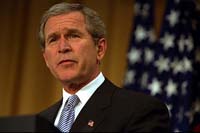President Bush aims at executive salaries in speech
President George W. Bush took aim Wednesday at huge salaries and bonuses for corporate executives, going to Wall Street to say compensation packages should be tied to how good a job a CEO does for the shareholders.

Bush came to New York to highlight optimistic news about the economy and to bring his economic message out of the shadows of the Iraq war. Shortly before he spoke, the government reported the economy grew at a faster-than-expected 3.5 percent pace in the final quarter of last year.
The president also was acknowledging the anger of Americans at stories about the enormous salaries and other perks for CEOs.
"Government should not decide compensation for America's corporate executives," the White House said in a report ahead of Bush's speech. "But the salaries and bonuses of CEOs should be based on their success at improving their companies and building value for their shareholders."
The White House statement appeared aimed in part at legislation that Rep. Barney Frank, chairman of the House Financial Services Committee, has said he will push, requiring shareholder approval of executive compensation plans.
Huge salaries and other perks for CEO have drawn ire from investors and made splashy headlines. Home Depot chief executive Bob Nardelli was earning an average of $25.7 million (Ђ19.8 million) a year excluding stock options before he was forced out in a furor over his hefty pay. He left with a severance package worth about $210 million (EUR 162 million).
In 2001, General Electric Co. paid chief executive Jack Welch $16.25 million. Welch was replaced that year with Jeffrey Immelt, who earned $3.4 million in total annual compensation in 2005, reports AP.
The New York Stock Exchange faced an uproar over former CEO Richard Grasso's $187.5 million (EUR 144.7 million) severance package. Former New York Attorney General Eliot Spitzer, now governor, sued members of the NYSE board over the package given to Grasso when he quit as chairman in 2003.
Subscribe to Pravda.Ru Telegram channel, Facebook, RSS!





